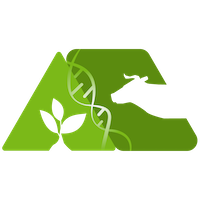Prepartum protein supplementation in Angus cows
Effects on reproductive efficiency and progenie performance: Doctoral thesis abstract
DOI:
https://doi.org/10.31285/AGRO.24.1576Keywords:
fetal programming, lactation, growth, pubertyAbstract
Cow calf operations in Argentina are managed under extensive grazing condition and the quality of forages is often poor during the second half of gestation. The present work investigated the effects of two levels of crude protein (CP) provided to mature dams during late gestation on their subsequent reproductive performance and milk yield, heifer’s (F1) postweaning growth, reproductive performance, milk production and grand offspring growth (F2). Sixty eight multiparous cows were randomly assigned to either low (LP, 6% CP) or high protein (HP, 12% CP) diets. Body weight (BW) and body condition score (BCS) of cows were determined, and milk production was measured until weaning. In the female, progeny time and BW at puberty, were determined. Reproductive and milk performance of female offspring until weaning, were recorded, as well as their offspring growth until weaning. The HP cows had greater BW gain during the prepartum period (P < 0,01) and tended to gain more BCS (P = 0,06) than LP cows. Pregnancy rates, milk production and composition were not influenced by dietary treatments. At puberty (P = 0,01) and pregnancy diagnosis (P = 0,05), HP heifers were heavier than LP heifers. No dam nutrition effects were found on offspring age at puberty (P = 0,98), final pregnancy rate (P = 0,28) or milk yield (P = 0,76), but heifers born from LP dams had greater milk protein percentage (P = 0,04) and tended to produce more milk fat percentage (P = 0,08) compared with HP heifers. The LP grand offspring grew faster from birth until weaning compared with HP grand offspring (P < 0,01). In conclusion, protein level of the diet during the prepartum period in multiparous beef cows affected the BW change at calving, without consequences on reproductive performance and milk quality and yield. Protein supplementation during late gestation did not affect reproductive performance of the offspring heifers but did impact their BW evolution, milk quality and grand offspring performance. The use of diet with low amount of protein during late gestation can affect progeny development and ability to nourish subsequent generations.
Downloads

Downloads
Published
How to Cite
Issue
Section
License
Copyright (c) 2020 Agrociencia Uruguay

This work is licensed under a Creative Commons Attribution 4.0 International License.
| Article metrics | |
|---|---|
| Abstract views | |
| Galley vies | |
| PDF Views | |
| HTML views | |
| Other views | |

















